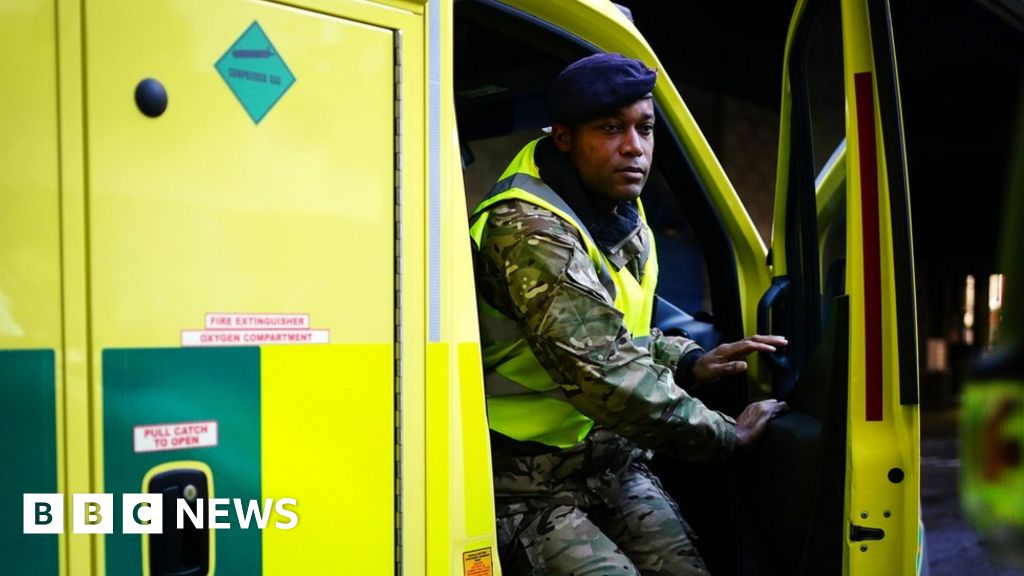daftandbarmy
Army.ca Fossil
- Reaction score
- 43,842
- Points
- 1,160
By that logic, after this year in Parliament, England should have won hands down.


By that logic, after this year in Parliament, England should have won hands down.


I'm sure that the Admiral will take this well
Military should 'do what they're told' and not express views on strike cover, Rees-Mogg says
The job of the military is to "do what they're told by the civilian authorities", MP Jacob Rees-Mogg has said in response to the head of the Armed Forces saying personnel should not be used as the "ultimate backstop" to cover striking public sector workers this Christmas.
The former business secretary and Tory back-bencher was responding to Chief of the Defence Staff Admiral Sir Tony Radakin's comments when asked how long the military can be relied upon to provide cover.
"Military Aid for the Civilian Authority (Maca) is a completely routine aspect of how this country is governed and they're called upon when necessary," Mr Rees-Mogg said.
"I'm a bit worried about senior military figures sounding off on their opinions.
"I think the job of the military is there to do what they're told by the civilian authorities, it's not for the military to be expressing their views.
"I don't think this is constitutionally how it should be.
"The military are not there to be making political statements about what they will or won't do, that should be carried out in private.
"I'm surprised they're making these comments."
Mr Rees-Mogg's comments come after Admiral Sir Tony told the Sunday Telegraph it would be "slightly perilous" to expect the British military to regularly stand in for striking public sector workers.
He added that military personnel are "not a spare capacity".
"We're busy and we're doing lots of things on behalf of the nation," Admiral Sir Tony added.
"We've got to focus on our primary role."
It comes after confirmation that 1,200 military personnel will be used to cover striking ambulance and Border Force staff in the coming weeks.
Admiral Sir Tony has said that the deployment is "miles off" impacting operational effectiveness, but it "has an impact on individuals and we have to acknowledge that".
Meanwhile, Defence Secretary Ben Wallace has said strikes over Christmas are 'ruining lives' of Armed Forces personnel.
And the former commanding officer of 1st Battalion Scots Guards, Colonel (retired) Lincoln Jopp, said military personnel called in to cover striking workers should get a daily bonus for their efforts.

Military should 'do what they're told' and not express views on strike cover, Rees-Mogg says
The Conservative MP said the military "are not there to be making political statements about what they will or won't do".www.forces.net

Yet?


Agreed and maybe Stephen could make a guest appearance? I think he'd get along well with the above three.Yet?
The PA has been screaming an announcement for ten years could a Mrs Margaret and a Mr Ronald to please pick up the red courtesy phone the globe is in need.
And if you have a seen Winston we could use him too.

Next minute - British Army deserts en masse to work at HeathrowUK border forces went on strike, Government sent in the military to take over temporarily. The result? Everything is running even smoother then before, who knew a few Corporals could do the job better...

Airports running ‘better than usual’ in ‘embarrassing’ blow to Border Force strikes
Government had been braced for disruption as a week-long strike by 1,000 passport staff at six airports beganwww.telegraph.co.uk
Next minute - British Army deserts en masse to work at Heathrow

I don't disagree, but the other aspect is that the military is one of the few (only?) groups where govt can demand action.It seems to me that only in the armed forces does the concept of responsibility still carry any weight. What I mean is, soldiers are tasked with carrying out orders of those above them, and to accomplish the end mission in accordance with those orders. Similarly, officers are accountable for having their tasks accomplished by providing clear direction and motivation to accomplish the task. I find today too many people are unwilling to a) give clear-cut orders (not suggestions, direction, or assistance) and b) take responsibility for receiving instruction and carrying out the orders, regardless of how they may feel about them.
I'm not an A-type personality. I'm not a huge fan of following the rules to the exception of all else. That being said, I am a huge fan of following rules that make sense, or understanding that while the rule may not make sense in a particular case, that if following it doesn't get in the way of accomplishing the mission, that you follow the rules. Rules, in general, are good thing. Hierarchies were established for a reason. If you signed up for a job, or a task, or hell, even volunteer work, then you follow the rules or the established hierarchy. Yet today bosses are afraid to say "this is what I want you to do, go do it" and employees don't say "yes boss, I will carry out your instruction" and then proceed to actually do it. Worse, in volunteer positions you get "Well, I'm a volunteer" when someone is asked why they didn't accomplish X task they didn't feel like doing. To my mind, if you sign up, volunteer or no, then you accept how things are, and you carry out instructions because you said you would. It's called integrity. Sometimes you need to go outside the rules to make things work, and that's a personal risk, but without a command structure and basic plan in place, there is little room for such initiative, because you can't count on anyone following through on the basics.
Armies, by definition, have to be an anachronism in that they have to get the job done. Taking the hill, delivering the ammo, or bringing the dispatch to HQ have to be accomplished no matter what, or people die and battles are lost, all for the want of a horseshoe nail. Your feelings, anxiety and sense of self-importance need to be subordinated to the needs of the organization, because that is what you said you would do - the system has to work, and the closer you adhere to the overall plan, then provided it is a good, or at least not terrible plan, then the more efficiently the process will work.
Armies are being poached by governments for all sorts of non-military tasks when they need something accomplished, simply because there is a culture of "getting the job done", and some level of pride in supporting the organisation to get the job done. It isn't really a surprise that when the army takes over, then the job gets done. The question is, while they are doing so, who is doing their job?
TBH, there are days where's it's even hard to get them to do the things that are in their job description...You can't task a Public Servant to do something that's not part of their job description.
It seems to me that only in the armed forces does the concept of responsibility still carry any weight. What I mean is, soldiers are tasked with carrying out orders of those above them, and to accomplish the end mission in accordance with those orders. Similarly, officers are accountable for having their tasks accomplished by providing clear direction and motivation to accomplish the task. I find today too many people are unwilling to a) give clear-cut orders (not suggestions, direction, or assistance) and b) take responsibility for receiving instruction and carrying out the orders, regardless of how they may feel about them.
I'm not an A-type personality. I'm not a huge fan of following the rules to the exception of all else. That being said, I am a huge fan of following rules that make sense, or understanding that while the rule may not make sense in a particular case, that if following it doesn't get in the way of accomplishing the mission, that you follow the rules. Rules, in general, are good thing. Hierarchies were established for a reason. If you signed up for a job, or a task, or hell, even volunteer work, then you follow the rules or the established hierarchy. Yet today bosses are afraid to say "this is what I want you to do, go do it" and employees don't say "yes boss, I will carry out your instruction" and then proceed to actually do it. Worse, in volunteer positions you get "Well, I'm a volunteer" when someone is asked why they didn't accomplish X task they didn't feel like doing. To my mind, if you sign up, volunteer or no, then you accept how things are, and you carry out instructions because you said you would. It's called integrity. Sometimes you need to go outside the rules to make things work, and that's a personal risk, but without a command structure and basic plan in place, there is little room for such initiative, because you can't count on anyone following through on the basics.
Armies, by definition, have to be an anachronism in that they have to get the job done. Taking the hill, delivering the ammo, or bringing the dispatch to HQ have to be accomplished no matter what, or people die and battles are lost, all for the want of a horseshoe nail. Your feelings, anxiety and sense of self-importance need to be subordinated to the needs of the organization, because that is what you said you would do - the system has to work, and the closer you adhere to the overall plan, then provided it is a good, or at least not terrible plan, then the more efficiently the process will work.
Armies are being poached by governments for all sorts of non-military tasks when they need something accomplished, simply because there is a culture of "getting the job done", and some level of pride in supporting the organisation to get the job done. It isn't really a surprise that when the army takes over, then the job gets done. The question is, while they are doing so, who is doing their job?
Well it's a step up from shooting and bayoneting the strikers.....99% of people will do their jobs under the right circumstances, and the military has no particular ‘moral high ground’ in this regard IMHO.
Although, having said that, the UK has seemed more than happy to use troops as scab labour over the years, which is a bit bizarre.
Well it's a step up from shooting and bayoneting the strikers.....


